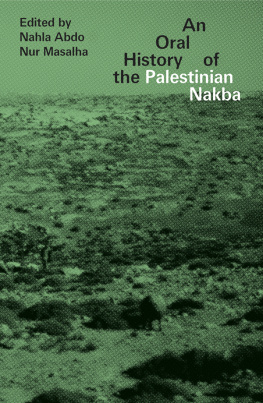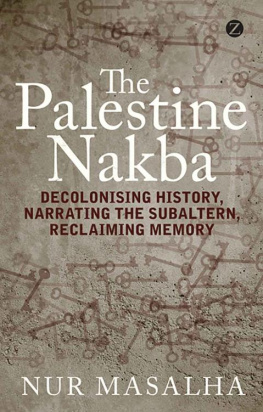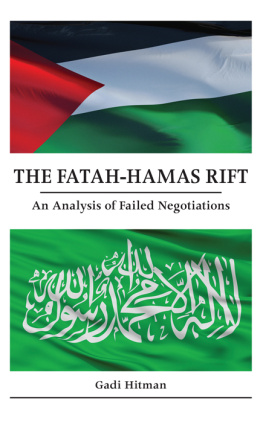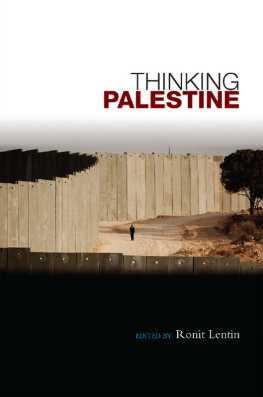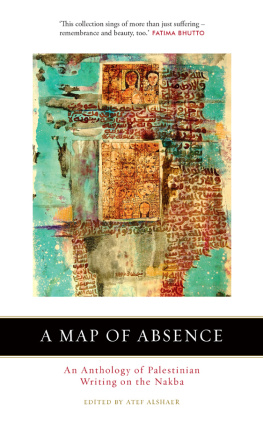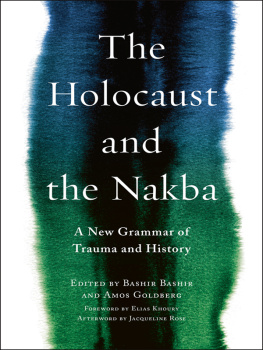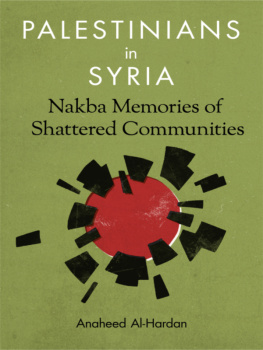
MORE PRAISE FOR AN ORAL HISTORY OF THE PALESTINIAN NAKBA
Moving and acutely observed, this timely and necessary anthology is an indispensable addition for all readers concerned with the Israeli colonisation of Palestine.
Ronit Lentin, author of Thinking Palestine
Reveals the full magnificence of Palestinian responses to Israels systematic post-1948 programme of memoricide. Abdo and Masalha are here establishing a new interdisciplinary field, Nakba Studies, in which Palestinians become subjects and agents in their own history.
John Docker, University of Western Australia
A landmark intervention, this cross-disciplinary book provides innovative analytical frameworks for studying the persistent erasure of Palestine. This insightful and comprehensive work proposes alternative ways of knowing and telling, rearticulating the Nakba as an ongoing process of dispossession.
Ella Shohat, NYU, and author of On the Arab-Jew, Palestine, and Other Displacements
An Oral
History
of the
Palestinian
Nakba
Edited by Nahla Abdo
and Nur Masalha

An Oral History of the Palestinian Nakba was first published in 2018 by Zed Books Ltd, The Foundry, 17 Oval Way, London SE11 5RR, UK
www.zedbooks.net
Editorial Copyright Nahla Abdo and Nur Masalha 2018.
Copyright in this Collection Zed Books 2018
The rights of Nahla Abdo and Nur Masalha to be identified as the editors of this work have been asserted by them in accordance with the Copyright, Designs and Patents Act, 1988
Typeset in Adobe Garammond Pro by seagulls.net
Cover design: Andrew Brash
All rights reserved. No part of this publication may be reproduced, stored in a retrieval system or transmitted in any form or by any means, electronic, mechanical, photocopying or otherwise, without the prior permission of Zed Books Ltd.
A catalogue record for this book is available from the British Library
ISBN 978-1-78699-349-6 hb
ISBN 978-1-78699-351-9 pdf
ISBN 978-1-78699-352-6 epub
ISBN 978-1-78699-353-3 mobi
Contents
NAHLA ABDO AND NUR MASALHA
NUR MASALHA
NAHLA ABDO
DIANA ALLAN
LENA JAYYUSI
ROSEMARY SAYIGH
LAURA KHOURY
FAIHA ABDUL HADI
HIMMAT ZUBI
AMINA QABLAWI NASRALLAH
HISHAM ZREIQ
SAFA ABU-RABIA
MONA AL-FARRA
MALAKA MOHAMMAD SHWAIKH
CHANDNI DESAI
At the outset, the editors would like to extend a special thanks to Dr Rosemary Sayigh for her central role in initiating this project. Thank you Rosemary for your inspiring scholarship and your unwavering commitment to keeping Palestinian memory alive. Our greatest thanks go to ordinary Palestinian women and men, victims of the Nakba/genocide whose voices, oral histories, narratives and memories and indomitable spirit made this work possible and without whom this project would not have seen the light. Our thanks also go the anonymous reviewers of this collection and to the editors at Zed Books for their generosity, patience and practical advice. Finally, and most importantly, our thanks go to all the authors/contributors whose extraordinary insights and passions enabled this collective project to come to fruition.
NAHLA ABDO AND NUR MASALHA
Oral history challenges the artificiality of the academic separation of the disciplines or, in Sherna Glucks words, the academic division of knowledge (Gluck 1991: 3).
This collective work uses oral history, personal memories, narratives and interviews to study, analyse and represent the Palestinian Nakba/genocide, before, during and after the establishment of the Israeli settler-colonial state in 1948. The multiplicity of disciplines and approaches presented in this book cover the complexity, and poignancy, of the Palestinian Nakba, reproducing in the process its historical and lived implications in a new light. Almost all authors in this volume attest to the resilience of the Nakba as experience and memory and its rootedness in the existential life of Palestinians. This rootedness defies all Israeli and international efforts at silencing the Nakba for the past seventy years. All authors in this book see the Nakba as a process and not as an event. Still, the memories and narratives of the specific calamities and horror inflicted on the Palestinians during the months of the establishment of the state of Israel have carved and continue to carve a deep space in the memory of those who lived it and the generations that followed.
theorizes the Nakba and oral history from two different, yet complementary perspectives. Nur Masalha provides a conceptual, analytical and critical framework for Palestinian oral history and memories of the Nakba. His chapter explores the role of individual, social and collective memories in shaping individual and national identity in Palestine. Applying social memory theory and cross-disciplinary and decolonizing methodologies to the knowledgepower nexus in Palestine, the chapter challenges settler-colonial histories and critiques the manipulation of collective memory by hegemonic elites and top-down nationalist approaches.
Nahla Abdo theorizes the Nakba as genocide. She critiques existing feminist approaches to the marginalized, and specifically the colonized, insisting on the need to apply historically and culturally specific concepts to our methodologies. She contributes to the development of anti-colonial feminist analysis suitable for understanding indigenousness and the settler-colonial state. Land and genocide, this chapter contends, need to be placed at the centre of feminist analysis of the marginalized, colonized indigenous analysis.
analyses the close relationship between what women knew and experienced during the Nakba, and focuses on the intimate relation and direct impact this knowledge has on indigenous bodies.
Diana Allans chapter explores the interweavings of affect and intellect in interviews recorded with Palestinian elders in Lebanon for the Nakba Archive. She examines the role that sensory and embodied experience play in recollection and in the narration of oral histories, and the forms of knowledge carried in embodied gestures, tone and the senses. Rather than viewing the sensuous simply as narrative embellishment, Allan considers what might be gained from re-centring the body as the locus of historical study, allowing for more diverse and non-coercive forms of remembering and knowledge creation.
Lena Jayyusi addresses the themes and idioms of Palestinian memory narratives of the Nakba, exploring the sites and features of affect, connectedness and resistance, both then and now. In this chapter special attention is placed on how the Palestinian population was struggling to hold on, if not to place, then at least to communal space, to vicinity as a lived affective and phenomenal field.
archives the Nakba through Palestinian refugee womens voices. These voices cover various areas, including Shufat refugee camp in the West Bank, refugees in Jordan and refugees in Lebanon. Rosemary Sayigh establishes the centrality of oral transmission of family and community histories that enabled and continues to enable the Palestinian people to assert their existence in the face of Zionist settler-colonial and international silencing.
Laura Khoury analyses the process of self-reflexive awareness that women undergo when they narrate the Nakba, contributing to the movement of writing history from below. Based on collective memories of elderly Palestinian women refugees in Shufat refugee camp, Khoury offers an indigenous feminist reading of the memorization of the Nakba by Palestinian women as they transmit some of the past, both consciously and subconsciously, to the present, creating continuity and transcending the present. Under scrutiny here, Khoury asserts, is what was not disrupted: something old that transformed into something new; new in its effect or its use, new in terms of formulating new activism and situating it in the present.
Next page
